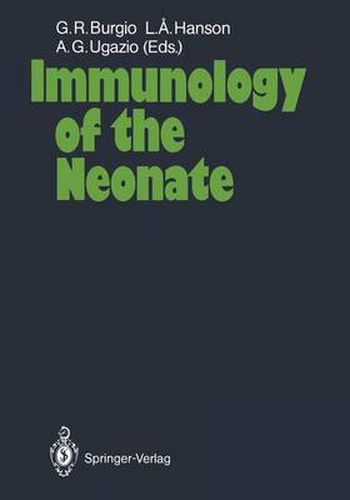Readings Newsletter
Become a Readings Member to make your shopping experience even easier.
Sign in or sign up for free!
You’re not far away from qualifying for FREE standard shipping within Australia
You’ve qualified for FREE standard shipping within Australia
The cart is loading…






This title is printed to order. This book may have been self-published. If so, we cannot guarantee the quality of the content. In the main most books will have gone through the editing process however some may not. We therefore suggest that you be aware of this before ordering this book. If in doubt check either the author or publisher’s details as we are unable to accept any returns unless they are faulty. Please contact us if you have any questions.
Over the last few years, many new observations have profoundly changed our concepts of the immune competence of the newborn. For the immune system, as for other systems and functions, the neonatal age represents a crucial transition period. In fact the immune characteristics of the fetus are likely to result fro- or be conditioned by - several often contradictory physiological requirements. On the one hand, it would certainly be an advantage for the fetus to acquire a complete immunocompetence as soon as possible in order to be able to cope with the eventual transplacental passage of pathogenic microorganisms and possibly also in order to reject maternal cells occasionally crossing the placental nd barrier. This is actually what occurs, at least in part, during the 2 and Jfd month of gestation when the fetus begins to acquire his biological individuality and at the same time the role of a biological ego resulting from the attain ment by the immune system of the capacity to discriminate between self and nonself.
$9.00 standard shipping within Australia
FREE standard shipping within Australia for orders over $100.00
Express & International shipping calculated at checkout
This title is printed to order. This book may have been self-published. If so, we cannot guarantee the quality of the content. In the main most books will have gone through the editing process however some may not. We therefore suggest that you be aware of this before ordering this book. If in doubt check either the author or publisher’s details as we are unable to accept any returns unless they are faulty. Please contact us if you have any questions.
Over the last few years, many new observations have profoundly changed our concepts of the immune competence of the newborn. For the immune system, as for other systems and functions, the neonatal age represents a crucial transition period. In fact the immune characteristics of the fetus are likely to result fro- or be conditioned by - several often contradictory physiological requirements. On the one hand, it would certainly be an advantage for the fetus to acquire a complete immunocompetence as soon as possible in order to be able to cope with the eventual transplacental passage of pathogenic microorganisms and possibly also in order to reject maternal cells occasionally crossing the placental nd barrier. This is actually what occurs, at least in part, during the 2 and Jfd month of gestation when the fetus begins to acquire his biological individuality and at the same time the role of a biological ego resulting from the attain ment by the immune system of the capacity to discriminate between self and nonself.